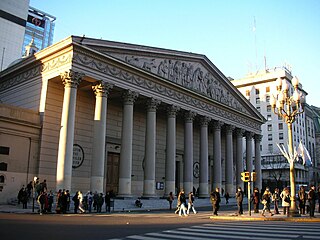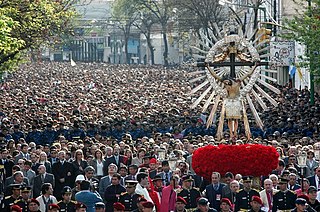
The Argentine Catholic Church, or Catholic Church in Argentina, is part of the worldwide Catholic Church, under the spiritual leadership of the pope, the Curia in Rome, and the Argentine Episcopal Conference.

Catholic higher education includes universities, colleges, and other institutions of higher education privately run by the Catholic Church, typically by religious institutes. Those tied to the Holy See are specifically called pontifical universities.

Christianity is the most widely professed religion in Argentina, with Roman Catholicism being its largest denomination. This historical background is very much due to the Spanish influence brought about through the newly conquered territories. However, affiliation with Protestant churches is increasing and immigration throughout the 20th century has brought other religions from various regions to Argentina.
A pontifical university is an ecclesiastical university established or approved directly by the Holy See, composed of three main ecclesiastical faculties and at least one other faculty. These academic institutes deal specifically with Christian revelation and related disciplines, and the Church's mission of spreading the Gospel, as proclaimed in the apostolic constitution Sapientiachristiana. As of 2018, they are governed by the apostolic constitution Veritatis gaudium issued by Pope Francis on 8 December 2017.

The Mariano Moreno National Library is the largest library in Argentina. It is located in the barrio of Recoleta in Buenos Aires. The library is named after Mariano Moreno, one of the ideologists of the May Revolution and its first director.
The Central American Technological University (Spanish: Universidad Tecnológica Centroamericana) (UNITEC) is a private coeducational institution with campuses in the three main cities of Honduras: Tegucigalpa, San Pedro Sula and La Ceiba.

The Pontifical Catholic University of Argentina, also known as Catholic University of Argentina, is a private university in Argentina with campuses in the cities of Buenos Aires, Santa Fe, Rosario, Paraná, Mendoza and Pergamino. The main campus is located in Puerto Madero, a modern neighborhood of Buenos Aires.

Antiguo Oriente is an annual peer-reviewed academic journal published by the Center of Studies of Ancient Near Eastern History (CEHAO). It is one of the few scholarly journals in the Spanish-speaking world that focus on the ancient Near East.

The Center of Studies of Ancient Near Eastern History is a university-based research institution of the Pontifical Catholic University of Argentina, Buenos Aires, Argentina, focused on the history and archaeology of the Ancient Near East. The CEHAO has many periodical publications. The center's flagship is Antiguo Oriente, an annual peer-reviewed journal. CEHAO also publishes, jointly with the Society of Biblical Literature, the open-access peer-reviewed Ancient Near East Monographs (ANEM). Finally, Damqatum, an annual journal aimed at the general public with publications of preliminary high-impact research results.
The University of San Andrés is a private university located in Victoria, Buenos Aires, Argentina on the shores of the Rio de la Plata, in the metropolitan area of Greater Buenos Aires. It is a small institution, with approximately 900 undergraduate students and 500 graduate students.
The University of CEMA is a private university in Buenos Aires, Argentina. It was founded by Carlos Rodríguez, along with Roque Fernández and Pedro Pou, as the Center for Macroeconomic Studies of Argentina (CEMA) University Institute in 1995, a pioneer in higher education programs in the areas of economics, politics, management, and finance in Argentina.
The Colegio Máximo de San José is a Jesuit religious college in San Miguel, Buenos Aires, Argentina. Pope Francis studied there during his youth.
Elba Perla Fuscaldo is an Argentinian Egyptologist, specialist in the ceramics of Ancient Egypt.
Alicia Daneri Rodrigo is an Argentine Egyptologist who earned a doctorate at the Universidad de Buenos Aires.

The Museo de Arqueología de la Pontificia Universidad Católica de Puerto Rico is a museum of archaeology located at the Pontificia Universidad Católica de Puerto Rico (PUCPR) main campus on Avenida Las Américas in Ponce, Puerto Rico. The museum is an educational unit of the Pontifical Catholic University of Puerto Rico's Biblioteca Encarnación Valdés, the university's main library. It has a collection of more than 10,000 artifacts from the past civilizations of Puerto Rico, including Igneri, Pre-Taíno, and Taíno cultures. In addition to displaying its permanent and special exhibitions, the museum also guards numerous other artifacts which are currently not on display due to its space limitations.

Mercedes Castellanos de Anchorena, Marquesa de La Iglesia Católica was an Argentine aristocrat and philanthropist. She commissioned the San Martín Palace and funded the construction of the Basilica of the Holy Sacrament, the Monastery of Saint Teresa of Jesus, and the Cathedral of Salta. Castellanos de Anchorena, dedicated to Catholic causes, also gave scholarships to students at the Pontifical Latin American College in Rome. She was ennobled by Pope Pius XI and awarded the Pontifical Golden Rose, becoming the first Argentine to be made a papal marchioness.

The Institute of Social Sciences Research is an excellence research center of the Pontifical Catholic University of Argentina and Associated Unit of the CONICET located in Buenos Aires, Argentina, dedicated to research in the field of the social sciences and the humanities.

Emilce Cuda is an Argentine theologian, university professor, and Roman Curia official.

The Most Reverend Mons. Don Jorge Ignacio García Cuerva is the Argentine Roman Catholic Archbishop of Buenos Aires. He has been appointed as Metropolitan Archbishop and the Primate of Argentina since 2023. He replaced his predecessor, Mario Aurelio Poli, because of his resignation.












